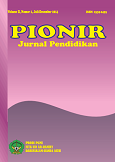PENGEMBANGAN BAHAN AJAR MODUL ILMU PENGETAHUAN ALAM KELAS IV DI SDN 3 REMPUNG
DOI:
https://doi.org/10.22373/pjp.v12i1.15637Keywords:
Bahan Ajar Modul Ilmu Pengetahuan AlamAbstract
This study aims to develop a science module as material for learning activities, especially in science subjects using the Borg and Gall research model which consists of 10 steps simplified into 7 steps, namely (1) conducting a needs analysis, (2) planning, (3) initial product development, (4) limited testing, (5) revision of product test results, (6) main product test, (7) final product revision. This study was conducted on class IV students with a total of 22 students. This research and development instrument uses validation sheets and student response questionnaires. The results of the media design expert validation test with a total score of "58" are in the range of 51 < X ≤ 63 with the category "Good". The results of the language expert validation test with a total score of "69" are in the range of X < 63 with the category "Excellent". The results of the material expert validation test with a total score of "72" are in the range of X < 63 with the category "Excellent". The results of the questionnaire of student responses to the validity and effectiveness of the use of the modules developed received an average score of "67.5" and were in the range of X < 63 with the category "Excellent". So that it can be concluded, the science module as material for learning activities is valid and effectively used in the learning process.
Keywords: Module Teaching Materials, Natural Sciences (IPA).
References
Belawati. (2013). Pengembangan Bahan Ajar. Jakarta: Pusat Penerbitan Universitas Terbuka.
Cecep, K., & Daddy, D. (2020). Pengembangan Media Pembelajaran Jakarta: PT. KENCANA.
Daryus, M., Firman, F., & Desyandri (2021) Pengembangan Modul Pembelajaran IPA Berbasis Contextual and Learning untuk Kelas IV DI SD. Inventa:Jurnal Pendidikan Guru Sekolah Dasar. Volume 5, Nomor 2, Hal. 298-300.
Hamzah, A. (2020). Metode Penelitian & Pengembangan. Malang: CV. Literasi Nusantara Abadi
Indrawini, T., Amirudin, A., & Widiati, U. (2017) Pengembangan Bahan Ajar Tematik Subtema Ayo Cintai Lingkungan Untuk Siswa Kelas IV SD. Jurnal Pendidikan, Volume 2, Nomor 11, Hal.1493-1495.
Isti’adah, N.F. (2020). Teori-teori Dalam Belajar. Jawa Barat: Anggota IKAPI
Kosasih, (2020). Pengembangan Bahan Ajar. Jakarta: PT. Bumi Aksara
Majid, A. (2017). Perencanaan Pembelajaran. Bandung: Remaja Rosdakarya
Mascita, D.E. (2021). Mencetak Bahan Ajar Cetak dan Digital. Bandung: CV. MEDIA SAINS INDONESIA.
Nursobah, A. (2017). Perencanaan Pembelajaran MI/SD. Pamekasan: Duta Media Publishing.
Sudaryono. (2016) Metode Penelitian Pendidikan Jakarta: PT. KENCANA.
Sujana, A. (2014) Dasar-dasar IPA: Konsep dan Aplikasinya Bandung: CV. Media Sains Indonesia.
Sutarti, T., & Irawan, E. (2017) Kiat Sukses Meraih Hibah Penelitian Pengembangan Yogyakarta: CV. Budi Utama.
Syafril & Zelhendri, Z. (2017). Dasar-Dasar Ilmu Pendidikan. Cimanggis, Depok: PT. KENCANA
Yektiastuti, R., & Ikhsani, J. (2016). Pengembangan Media Pembelajaran Berbasis Android pada Materi Kelarutan untuk meningkatkan Performa Akademik Peserta Didik SMA. Jurnal Inovasi Pendidikan IPA, Volume 2, Nomor 1, Hal. 88-99.
Yuristia, F., Hidayati, A., & Ratih, M. (2022) Pengembangan Modul Pembelajaran Tematik Muatan Materi IPA Berbasis Problem Based pada Pembelajaran Sekolah Dasar. Jurnal Basicedu Volume 6, Nomor 2, Hal. 2405-2408.
Downloads
Published
Issue
Section
License
- Authors retain copyright and grant the journal right of first publication with the work simultaneously licensed under a Creative Commons Attribution License that allows others to share the work with an acknowledgment of the work's authorship and initial publication in this journal.
- Authors are able to enter into separate, additional contractual arrangements for the non-exclusive distribution of the journal's published version of the work (e.g., post it to an institutional repository or publish it in a book), with an acknowledgment of its initial publication in this journal.
- Authors are permitted and encouraged to post their work online (e.g., in institutional repositories or on their website) prior to and during the submission process, as it can lead to productive exchanges, as well as earlier and greater citation of published work (See The Effect of Open Access).

